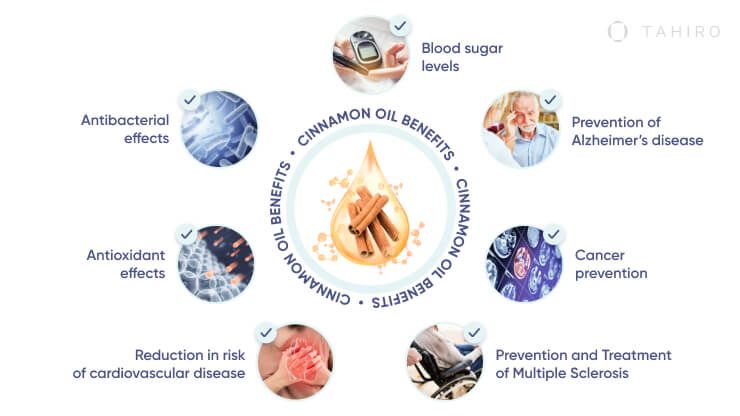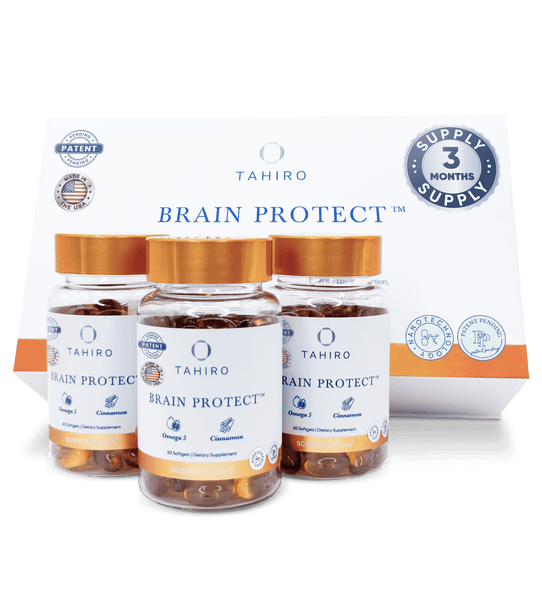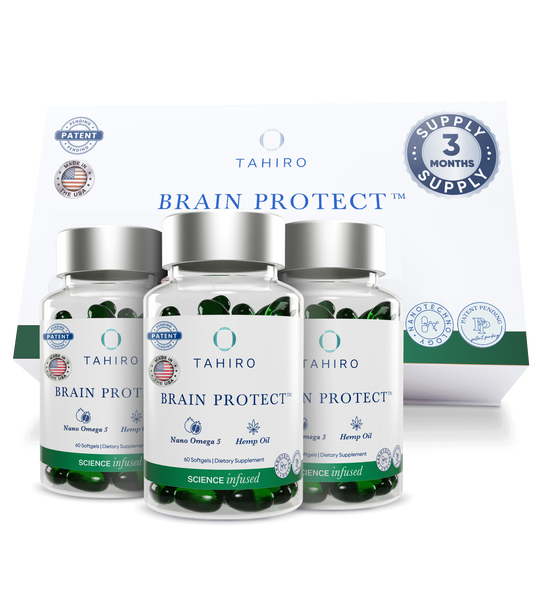Cinnamon is such a commonly used spice you probably never gaveit much thought, but cinnamon was once more valuable than gold. It has beenused in religious rites and as a flavoring, and at one point, cinnamon was themost profitable spice in the Dutch East India Company trade. In recent yearsresearchers have once again confirmed cinnamon’s value, but this time as itapplies to health, well-being, and cognitive function. Let’s look at the healthbenefits of cinnamon oil.
What are the Health Benefits of Cinnamon Oil
Cinnamon oil is much more potent than the dried spice cinnamon. Cinnamon oil [1] is produced from the dried inner bark of the shoots of the coppiced trees of Cinnamomum zeylanicum. Most cinnamon trees are found in Sri Lanka, India, and Brazil [1]. While research on the cognitive benefits of cinnamon on humans is yet to be concluded, significant scientific evidence has been established through studies conducted on live organism models (in vivo) and at the cellular level (in
vitro). These investigations have provided valuable insights into the potential health benefits of cinnamon oil on humans. Here are some of the documented health benefits of Cinnamon oil:
-
Blood sug levels
Research is mixed on the effect of cinnamon on blood sugar levels, but a 2015 review [2] showed that cinnamon may reduce blood sugar levels. Subjects with type 2 diabetes who consumed cinnamon daily had lower glucose, triglycerides, and total cholesterol.
-
Prevention of Alzheimer’s disease
Alzheimer's disease remains a devastating condition without a definitive pharmaceutical prevention or cure; current medications only aim to delay its progression. However, researchers are now exploring the potential of plant-based spices and plants in providing positive outcomes. In a significant study [3], mice treated with cinnamon extract exhibited a reduction in Alzheimer's-related features, including amyloid plaques, and demonstrated improved cognitive functions, offering promising insights for potential preventive approaches.
-
Prevention and Treatment of Multiple Sclerosis
People with Multiple Sclerosis (MS) have lower T cells, a type of white blood cell that plays a crucial part in the immune system and protects against disease. Cinnamon treatment has prevented the loss of proteins specific to T cells. Also, scientists have found that cinnamon resorted myelin levels in mice with MS [4].
-
Reduction in risk of cardiovascular disease
High blood pressure is associated with an increase in cardiovascular disease. In one
study on animals, cinnamon reduced blood pressure [5].
-
Cancer prevention
One study [5] noted that cinnamaldehydes may have antitumor and anticancer properties.
-
Antioxidant effects
Cinnamon has powerful antioxidant effects. A review [5] of studies on the antioxidant effects of cinnamon supplementation resulted in a significant reduction of C-reactive protein (CRP). CRP is a protein made by the liver that increases when inflammation is present.
-
Antibacterial effects
Research suggests that cinnamon oil has antibacterial and antifungal effects on oral health and can prevent and treat oral infections and cavities. Cinnamon oil can also be used as an antibacterial preservative for foods to extend shelf life and as a preservative in cosmetics and hospital disinfectants.

What is the best way to use cinnamon oil?
While aromatherapy provides temporary relief and cosmetic products yield hair and skin results, they may not extend benefits to the entire body. To fully harness the potential of cinnamon oil, consumption is recommended. However, ensuring adequate intake of this remarkable ingredient can be challenging, especially as its health-promoting properties may diminish during cooking.
So, how can you unlock the full potential of cinnamon oil? Highly recommended are cinnamon oil supplements, easily available and suitable for daily use. These supplements allow the beneficial compounds to gradually accumulate, promoting optimal results throughout your body.
Is Cinnamon Oil Safe to Consume?
Ceylon, considered true cinnamon, is native to Sri Lanka and southern parts of India. It’s made from the inner bark of the Cinnamomum verum tree. Cassia cinnamon contains Coumarin, which can be harmful in large doses [6] Cassia contains approximately 1% coumarin, while Ceylon contains only 0.004%, or 250 times less, which is so low that it’s often undetectable.
Cinnamon and its active ingredients, including cinnamaldehyde, coumarin, cinnamic acid, and eugenol, are all listed as safe and non-toxic on the FDA Generally Recognized as Safe (GRAS) list. Consumption of cinnamon and its active ingredients should be moderate as part of a balanced diet, and it's important to consult with a healthcare professional before consuming high amounts of these compounds or taking supplements containing them.
When to Take Cinnamon Oil Supplements
Cinnamon oil supplements are widely recommended to a broad spectrum of individuals, especially those with specific health conditions or concerns. Thanks to the extensive range of benefits mentioned in the article, these supplements hold promise for individuals seeking improved heart health, blood sugar management, cognitive function, and more.
For individuals with diabetes or insulin resistance, incorporating cinnamon oil supplements into their daily routine may help promote better blood sugar regulation and reduce sugar cravings. Similarly, those looking to enhance their cognitive health or manage neurodegenerative concerns might find it beneficial to take cinnamon oil supplements regularly.
For those who seek to optimize their cognitive health and take steps toward the prevention of early brain degeneration, Brain Protect™ Nano Omega 5 Cinnamon presents an unparalleled choice that surpasses conventional 'Cinnamon Supplements.' Its brilliance lies in groundbreaking nano omega 5 formulation and a unique delivery system, achieving optimal absorption throughout the bloodstream, including the brain, potentially crossing the blood-brain barrier. This patent-pending formula creates synergy between two neuroprotective ingredients in Brain Protect™: Punicic acid, also known as omega-5, and the star of this article, cinnamon, to achieve optimal health benefits.
While its daily serving (two 600 mg softgels) may not immediately reveal a significant amount of cinnamon, its formulation in nano droplets dramatically enhances bioavailability, equivalent to a much larger consumption. Over time, this leads to the accumulation of neuroprotective benefits throughout the body, including the brain.





